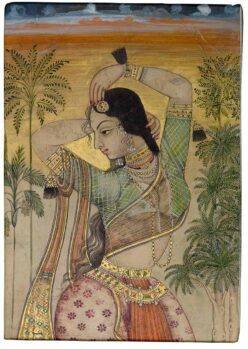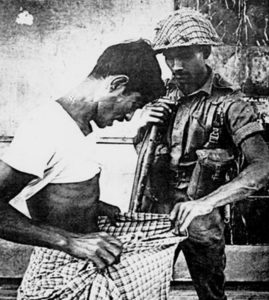[During the month of December I wrote several articles in Bangladeshi newspaper about the runup to the election in 30th December. I am going to post some of these here so that BP readers may get a native perspective on what’s going on.]
As Bangladesh heads to parliamentary elections to be held on 30th December, only a risk-loving gambler would bet against the governing party returning to power. In its latest country report, Economist Intelligence Unit (EIU) expressed the conventional assessment that the Sheikh Hasina’s government will retain power easily. The analysis powerhouse based this expectation mostly on the strong economic performance of Bangladesh in the last decade under the current regime. Over the last ten years, GDP growth in Bangladesh averaged well over six percent and is projected to be even higher in the next few years. Foreign exchange reserve has increased more than fourfold, and the currency has remained steadfast against hard currencies. During the last ten years the Bangladeshi currency has lost only twenty percent of its value against US Dollar while the Indian Rupee lost thirty-one percent and Pakistani Rupee forty-one percent.
Not just in economy, Bangladesh has made great strides in social development. By World Bank estimates, national poverty rate dropped from forty percent to twenty-four percent in the ten years preceding 2017. By Bangladesh government estimates, by 2015 the country has already achieved many of the Millennium Development Goals, for example in nutrition, primary education, child mortality, maternal health etc., far ahead of most of the LDCs. These growth and developments were not urban-centric either, rural household income increased by forty percent from 2010 to 2016.
However, the ongoing pre-election period may baffle an outside observer because, despite strong economic growth and widespread expectations of a win, the regime is carrying out an unprecedented campaign of repression of political opponents. Not only the ruling party is visibly controlling every facet of the administration, including the election commission, but the party is using these state organs to directly thwart, attack, arrest, harass opposing candidates countrywide. This would not surprise regular observers of Bangladesh affairs because, along with the remarkable economic growth, the last ten years were also marked by clear democratic backsliding and authoritarianism. German research group Bertelsmann have been keeping tabs on democratic development in the world since 2005. Its indexes show that status of democracy in Bangladesh has been rapidly deteriorating since the non-competitive election of 2014 and in 2018 Bangladesh was downgraded from a highly defective democracy to a moderate autocracy.
The level of repression before the election suggests that the rosy economic and development numbers may not be providing a faithful representation of the economic well-being of the general people. A recent report by International Labor Organization (ILO) said that youth unemployment in Bangladesh grew by seven percent from 2010 to 2017, one of the worst unemployment growths in developing countries. In a pre-election assessment of the economy of last ten years, CPD, the venerable Bangladeshi thinktank, put forward the calculation that one-third of the educated youth are unemployed. In the recent years, the country has been rocked by several urban youth movements demanding more access to government jobs, for many the only avenue for upward mobility.
At the same time, several estimates from Bangladeshi sources say that as many as half million foreign nationals, mostly Indians, work in Bangladesh in skilled/white collar jobs. This lack of Bangladeshi educated and skilled workers is greatly explained by the dismal state of higher education in the country. Times Higher Education produces annual world university rankings with one of the largest coverage of universities. In the latest 2017 rankings, there are more than thirty Indian universities and five Pakistani universities among the top one thousand universities of the world. Bangladesh has zero. World Bank data shows that during the last ten years, Bangladesh annually spent only about two percent of its GDP in education while Pakistan spent near about three percent and India three and half percent.
Economists studying development argue that a country’s long-term economic growth comes mainly from two sources, investing in human capital and investing in physical capital. From previous discussion, we have seen that human capital development in Bangladesh has been significantly below par to its neighbors. In investment, the picture is not much better either. The previously mentioned CPD report showed that in the last ten years both private investment and foreign direct investment growth in Bangladesh were anemic. Rather than investments, much of the ‘miraculous’ economic growth of Bangladesh have come from exports, consumption and government spending.
Export growth, in particular, has been spectacular; more than doubling from seventeen billion USD in 2009 to thirty-seven billion in 2017. For comparison purposes, Pakistan’s total export in 2017 was less than twenty-five billion USD. However, if we look at the composition of export, a stark imbalance appears like the elephant in the room. More than eighty-five percent of the total exports of Bangladesh is just from one product category, ready-made garments (RMG) and textiles. Any development economist would say that such high level export dependence on just one product is alarming for any country and any product. RMG may be an especially bad basket to put in all the eggs.
Garments is a low-technology, labor intensive industry that mostly depends on ready-to-export, turn-key factory units. Although the industry employs a great number of factory workers, lack of learning and upgrading in jobs mean that workers have short shelf-life and are unceremoniously terminated after the end of productive years. The mature technology of RMG means there is little effort for innovation, R&D in the export industry. Thus, there is a lack of need for skilled and technology workers, which means that the industry provides little demand for development of human capital and technological capabilities in the country.
A particular feature of garments industry is that, unlike chemicals, machinery, IT services etc., it has very little input-output relations with other major export industries. This means that development of garments industry does not spill over to development of other more value-adding industries. Despite frequent boastful proclamations from regimes and entrepreneurs, industries like pharmaceuticals, electronics, IT services, chemicals etc., are prominent in the Bangladeshi export basket by their insignificance and absence.
Some economists argue that “countries become what they make”. The RMG industry, by dominating Bangladeshi economy for long time, has not only dramatically shaped the society but also the politics. This is a strikingly unequal industry with a few dominating large firms and many small firms servicing those large firms; there is a conspicuous lack of mid-sized and diverse firms. The industry creates a narrow business elite that can easily collude with the government for preferential treatment. The regime, in return from this privileged treatment of the industry, obtains assurance of steady and increasing revenue which it invests in building up the bureaucracy and infrastructure. This growing public investment not only help boost the GDP but also provide the political regime with means to buy off loyalty of bureaucracy and civic society. Regimes then use the RMG-fueled state and civic power to suppress political opposition and stage ‘managed’ elections. We have witnessed these intimately related events again and again in recent years, most notably in Cambodia, another RMG-dominated country, where the ruling regime just staged an election in 2018 where it ‘won’ hundred percent of the seats.
Many technology, economics analysts have argued recently recently that Bangladeshi garments industry is a prime candidate for severe incoming disruption from automation. Development of new automation technology, changes that are now within realistic realm, can wipe away advantages of cheap labor at a stroke and render millions of garments workers jobless worldwide. The spectacular growth of garments industry in Bangladesh explains source of the dominating power the ruling regime has over political opponents. At the same time, the uneven economic and social development from this industry and the very precariousness of the industry’s future, help us understand why there is simmering discontent among aspiring citizens. The puzzle of repression during times of plenty, is not so baffling after all.

